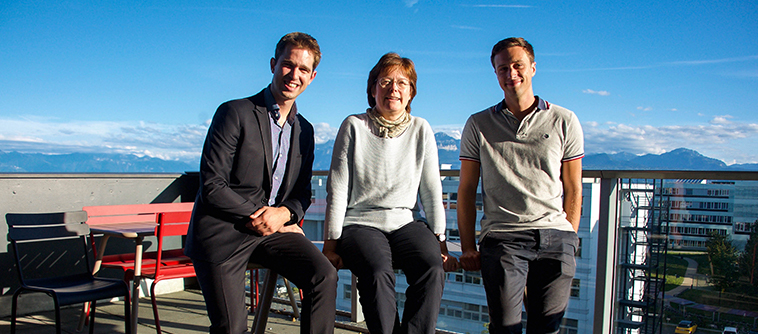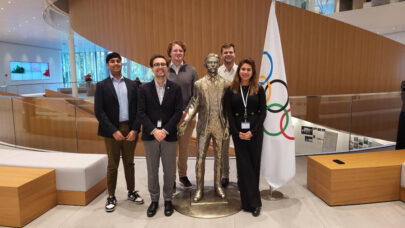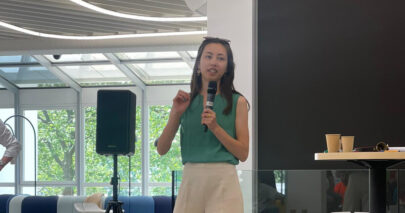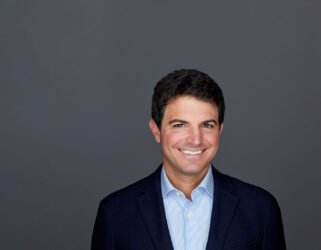
Professor Pulcrano Please start by telling us what your startup is and does?
Amaël Cohades: CompPair is a spin-off of the École Polytechnique Fédérale de Lausanne, EPFL. We founded the company in 2020 with a mission to help manufacturers, consumers, and the planet. Our value proposition is to reduce maintenance and repair costs while having a positive impact on the environment, as we want to reduce the amount of material waste in the world. Specifically, we produce semi-products to build healable and recyclable composites for the leisure, wind, and aerospace industries. By composites I mean fiberglass, carbon, or natural fibers embedded in resin, 90% of which are not recycled. You might have composites in your expensive racing bike, and if you get a tiny crack it can lead to catastrophic failure, which would take an average of seven hours to repair. On a fiberglass boat, it could take days. We can carry out repairs in minutes.
Professor Pulcrano: What kinds of customer projects and products do you engage with?
Amaël Cohades: A few cases that we can discuss publicly would include producing the materials for skis with Salomon, and sporting goods with Decathlon (almost 1,700 stores in 60 countries). We’re also in the nautical industry with Gunboat, a French/American company that builds catamarans utilizing the latest in race boat technology. In our aerospace vertical, we’re working with the European Space Agency, and we also had a mandate with Ariane Group, a joint venture between Airbus and Safran.
Professor Pulcrano: What’s your exit strategy?
Amaël Cohades: Belgian chemical company Solvay has made several acquisitions, including Cytec, a composites company, for $6.4 billion. That’s one possible strategy; to be acquired by a large corporate in our domain. We need to be open. For example, the aerospace industry practically has a monopoly with some players.
Professor Pulcrano: Sustainability and enhancing the circular economy is part of your company goals, but do you believe investors care?
Amaël Cohades: You have to do your due diligence and choose the right investors, but today 90% of good investors have an impact investment thesis in their funds. This is something that has changed completely in the last few years. I don’t think we’re taking any risk by presenting ourselves as a sustainability investment.
Professor Pulcrano: After your studies and research at the EPFL, what compelled you to start a company?
Amaël Cohades: I finished my PhD in 2018 with a really good technology and had published some scientific papers. We didn’t see any commercial potential at that time because the mechanical properties were not sufficient. But then, together with my thesis advisor Véronique Michaud, we started playing around, trying new things, and they worked. This could’ve been just another step towards an academic career, but with this breakthrough I knew I had to make a choice. During my research, I was a scientific consultant for JEC World, the biggest trade fair in composites. One day, in Paris, I had lunch with the director, and she asked me if my research really worked. I think it was April 2018. I told her, “Yes, actually it does work.” She looked at me and said, “You can’t miss this opportunity. What you have is incredible! You have to go for it.”
Professor Pulcrano: So, if you hadn’t had that lunch in Paris, you would have been a great teacher, and CompPair would never have been born?
Amaël Cohades: I can’t say for sure. My professor, Véronique, who is also a cofounder, brought me together over dinner with a well-known entrepreneur in the composites industry, and he told us, “You’re mad not to do this!”
Professor Pulcrano: What’s been your biggest challenge so far?
Amaël Cohades: The first thing was the business model. Few entrepreneurs have been successful launching startups in the materials field, and usually it’s because of business model issues. Second, and very related, is turning the technology into a product that your customers can easily use. Third was around the investments and getting to know the world of fundraising. I’m convinced of our case and of our future success, but we needed to learn how to pitch, how to present CompPair transparently, but in a way that’s understandable and shows its potential. Finding investors wasn’t difficult but knowing how to sell to them took some time. I lost so much time due to basic mistakes.
Professor Pulcrano: How do you handle potential investors?
Amaël Cohades: I receive requests from VC funds every day, which is normal. My first question, which might seem arrogant, is “What is your investment thesis?”, and then, “At which stage do you invest?”, and finally, “What is your ticket size?” And if the answers to any of these are out of our focus I say, “Thank you, I’m sorry but maybe this will be for our next round.”
Professor Pulcrano: What other challenges do you face?
Amaël Cohades: The last challenge, and it’s a healthy challenge, is how to grow the company with the right structure, putting your team members at the center, and being sure that your team members are growing well with the company. I can’t do everything alone, so my role is to be sure that my team members are well chosen and positioned, and to put the right processes and tasks in place so we can deliver what we need for success. Actually, sometimes it’s frustrating for me because I sometimes feel like I’m not doing anything, but that’s the way it should be.
Professor Pulcrano: That means you’ve got a great team, and you’ve put the right structures, processes, and incentives in place so that you don’t have to make all the decisions.
Amaël Cohades: That’s my goal, rather than me or Robin Trigueira, my co-founder, having to make every single decision, because then there’s no ability to scale. If you must be involved in everything, that limits how far and how fast you can grow. We are 17 people today, but I think I’m still doing too much at a low level. One of my personal challenges is learning to delegate more and better. It’s difficult, because two years ago it was just the two of us, and we were doing everything. It’s difficult to break that habit!
Professor Pulcrano: So, coming to IMD now, why did you apply to the IMD Startup Competition?
Amaël Cohades: We believe we can learn from others, and someone once told us that we are very coachable. When we looked at the IMD Startup Competition, we thought it would be very useful to have senior executives, people from the corporate world, help us with our strategy. Of course, they’re not used to the startup world, trying to grow as fast as possible, and that sometimes this means compromising on your processes.
Professor Pulcrano: You worked with a team of IMD EMBAs through the summer and fall of 2021, during COVID, so, of course, we were not able to travel to Silicon Valley as we usually do. What do you remember of the experience of working with the EMBAs?
Amaël Cohades: We have exchanges with our customers, but with the EMBA students we could have really deep discussions. They gave us very constructive feedback. Some of it was painful, but it was always given in a respectful and useful way. I remember a specific session at IMD, a whiteboard filled with everything, and an exciting debate with the EMBA team. We wanted them to think of how they’d pitch the company, which meant critiquing our strategy. I was with Nicolas Gandar, CompPair’s Chief Business Development Officer. We showed what we were doing, but left some white spaces, or open questions, in our go-to-market approach.
Professor Pulcrano: So, you left an opening for them to fill in the strategy the way they would have done it?
Amaël Cohades: Exactly. It was challenging, but also very stimulating. And fun!
Professor Pulcrano: Was it a collaborative environment? Or very stressful?
Amaël Cohades: No, not stressful at all. It was a highly collaborative environment. I have to say, I couldn’t believe they could get so deeply into our project so fast and with such enthusiasm, and that we could get such great inputs from them.
Professor Pulcrano: If you look back, what do you see as the most important elements of working with the EMBAs? And what was your biggest takeaway from working with them?
Amaël Cohades: They gave us strategic insights on our market activities and how to proceed with our strategy. Really reflecting on the strategy, and tearing it apart with the MBAs, was something that we really liked. The biggest takeaway was to focus on our biggest customers, the ones with the most potential, and to stop the craziness of chasing after small customers, or small applications, that will never bring enough value to the company. Tons of customers, tons of people, tons of ideas and requests!
Professor Pulcrano: Opportunity overload! We’ve talked about this often.
Amaël Cohades: Yes, but you need to choose, and you need to focus and have discipline. The EMBA team helped on this in a very constructive way.
Professor Pulcrano: The EMBAs pitched CompPair to Silicon Valley VCs. How did it go?
Amaël Cohades: Actually quite well, and I’m back in contact with one of those investors now.
Professor Pulcrano: Looking ahead, what’s your biggest scaling challenge besides fundraising?
Amaël Cohades: Positioning ourselves correctly in the supply chain, where we believe strategic partnerships are the way to go. You can’t tell customers that they have to change their entire manufacturing line, even before using your solution; you have to fit in with them. Also looking at how to grow efficiently, even with the scary raw materials shortages.


